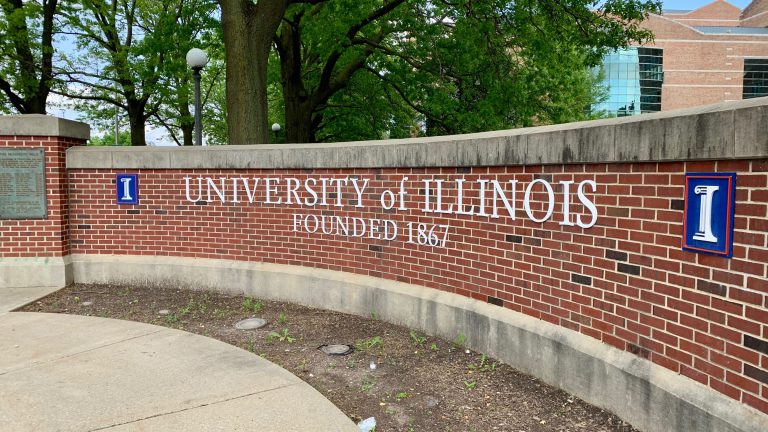URBANA – Graduate student workers, facilities and maintenance employees, professors and students at the University of Illinois’ Urbana campus criticized the institution’s response to COVID-19 during a virtual town hall Tuesday afternoon.
The forum was hosted by the Campus Labor Coalition, a group of unions representing workers on campus. Those who spoke expressed a wide range of concerns, from lack of hazard pay for essential workers to questions about transparency around how the U of I is reporting COVID-19 cases on campus. Many said they were frustrated that they were not invited to discussions around how or if the university would reopen during the COVID-19 pandemic.
Graduate student employees and non-tenure track faculty members also expressed concerns about lack of reimbursement for equipment needed to teach students remotely.
Amanda Bales, a lecturer in the English department and vice-president of the Non-Tenure Faculty Coalition, said their membership shares many concerns with campus-related unions.
“Unfortunately a lot of those experts and incredible minds (at the university) don’t understand the lived experiences of the workers on campus,” Bales said. “Union representation hasn’t been at a lot of those decision-making places where we could have those lived experiences represented.”
Organizers of the town hall said they invited university administrators and had hoped they would attend and respond to the concerns raised — but no one did.
Ed Dalton, a building service worker at the U of I and member of SEIU Local 73, said changes in shift hours and days have wreaked havoc on the lives of service workers.
“It has created problems with some of the workers with daycare and afterschool programs… some workers have even quit second jobs they held down for years to supplement their income — we don’t make a lot of money — we depend on those second jobs… but that wasn’t even taken into consideration,” Dalton said.
Emily Williams, an undergraduate studying community health, says she resigned from her position as a resident advisor due to concerns about the pandemic. Williams said she’s frustrated that those still working for university housing do not receive hazard pay.
“Walking through an entire building that may contain coronavirus on commonly touched surfaces and doorknobs is hazardous. Potentially interacting with residents who are confirmed positive cases or close contacts to the virus is also hazardous,” Williams said.
Hannah Ramirez-Porter, an undergraduate transfer student and a food service worker on campus, said she’s worried for her safety while on the job.
“The university is allowing alumni and corporate conferences to continue within our conference center and forcing student workers to serve mask-less diners.” Ramirez-Porter said. “There’s absolutely no reason beyond financial interest that these conferences should continue in their current capacity.”
Daniel Gilbert, with the Campus Faculty Association, acknowledged that tenured faculty, which that group represents, are among the most securely employed at the university. He said the CFA is concerned about the threshold at which administrators would decide to shut down the campus. (U of I administrators have yet to answer this question, and cases on campus have exceeded what was initially projected for the entire semester.)
Lesley Owens, a member of the Graduate Employees’ Organization, said she’s concerned that there may be well over 3,000 cases of COVID-19 on campus by the time students leave in late November. As of Monday, Sept. 21, there were more than 2,100 confirmed COVID-19 cases on campus.
“I don’t believe the university has made it clear to undergraduates the risks that they are taking by being on this campus,” Owens said, adding that they want “clearer and more honest representations of data” from the university.
An undergraduate senior, Nona Porter, said they don’t understand why testing on the campus is restricted to students and employees. (U of I administrators have said they plan to expand testing to the broader Champaign-Urbana community in the coming weeks.)
Porter said they do not feel safe as a student on campus.
“I am very scared and I’m furious,” Porter said, adding that students who are infected aren’t offered financial or food assistance.
“How many of your students have to suffer lifelong damage to their bodies, to their trajectory. We come here because we are looking for a better trajectory for our lives… that has been completely defaulted on.”
“I think what the university is currently doing right now is wrong, morally and ethically wrong,” said Reina Revina, another student. Revina said they contracted COVID-19 earlier this year and still suffers from breathing problems.
“I could not imagine how I could live with myself if I had given it to someone else, and potentially killing them. And the university is proving that they can live with the guilt,” Revina said.
Several attendees also criticized the U of I System’s Shield T3 program, which is described on the university system’s website as an effort to sell their testing technologies and software to other institutions, “as a business that provides the value of SHIELD to entities across the world. These entities will pay for access to SHIELD at a price point that saves them time, effort, and costs associated with starting and running SHIELD.”
William Sullivan, a U of I professor who leads the Rokwire initiative that developed the Safer Illinois app, said it’s “an open-source piece of software available to anyone in the world, and it’s free.”
“I was not involved in the launching of Shield T3, I don’t attend meetings. But I was aware they were taking our software and using it,” he said.
An organizer of the town hall called Provost Andreas Cangellaris’ office during the forum. They were told that the provost was unavailable.
Lee Gaines is a reporter for Illinois Public Media.
Follow Lee Gaines on Twitter: @LeeVGaines

